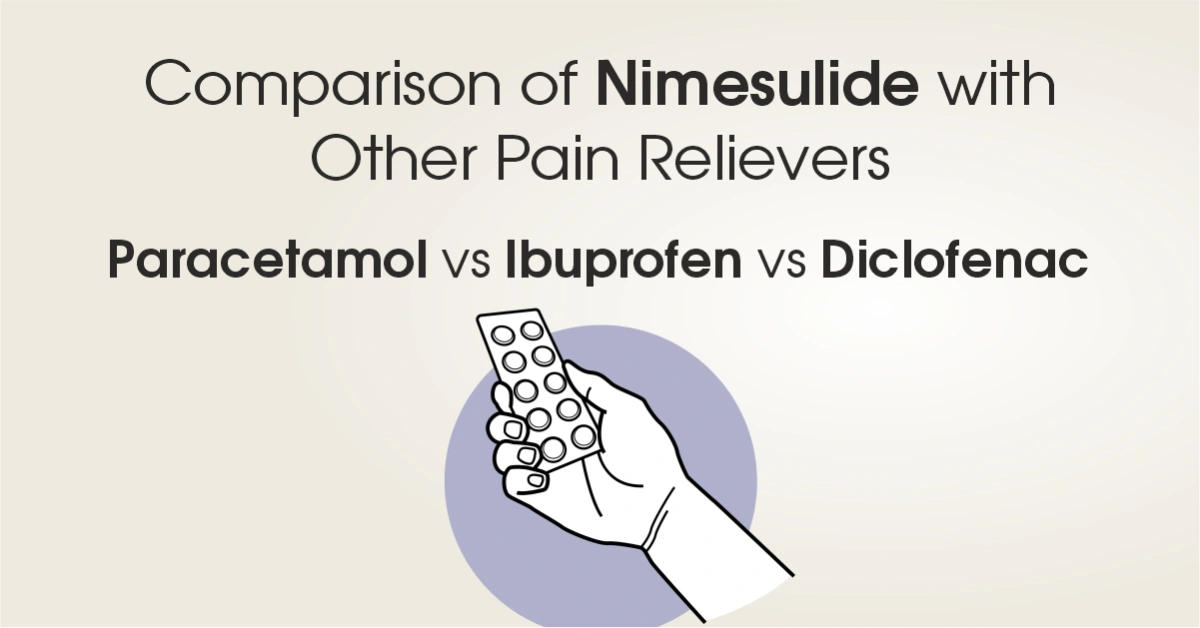Nimesulide is a well-known medicine that belongs to a group of drugs called non-steroidal anti-inflammatory drugs, or NSAIDs. Doctors often recommend it to relieve pain, reduce swelling, and bring down fever. Unlike common painkillers that mainly lower temperature or just ease discomfort, Nimesulide is chosen when there is both pain and inflammation—such as in joint problems, muscle aches, or period cramps.
How Nimesulide Works in the Body
The key to Nimesulide’s action lies in its ability to block certain natural substances that trigger pain and swelling. In simple terms, it slows down the activity of enzymes known as cyclo-oxygenase (COX), which are involved in producing chemical messengers called prostaglandins.
These prostaglandins normally act like signals that tell the body to start the pain-and-inflammation response. By reducing their production, Nimesulide helps calm down the reaction, leading to less pain, less heat, and reduced swelling. This targeted effect is why it is often preferred for conditions that are not just painful but also inflamed.
Nimesulide for Pain and Inflammation
Nimesulide is used for several types of pain that come with an inflammatory component. Doctors may prescribe it for arthritis-related joint pain and stiffness, aching muscles after injury or strain, menstrual cramps that cause sharp lower-abdominal pain, and headaches that are linked with fever or body aches.
It is sometimes used for short periods to bring down fever in adults when other common medicines do not give enough relief. Because of its quick onset, many people find that it eases pain faster than some other NSAIDs, although its use should always be guided by a healthcare professional due to its specific safety profile.
Available Forms and Recommended Dosage of Nimesulide
Typical Adult Dosage & Duration
Most adults are prescribed 100 mg twice daily (about every 12 hours). Use it for the shortest possible time, often just a few days, because longer use raises safety risks, especially for the liver. Do not increase the dose on your own, and stop as soon as your doctor advises. Medical supervision is important if you have any history of liver or kidney problems, drink alcohol, or take other medicines that can affect the liver.
Dosage Forms (What You May Receive)
- Tablets: The most common option; easy to take with water and acts systemically for body-wide pain and inflammation.
- Capsules: Work similarly to tablets; some people find them easier to swallow.
- Oral suspension (liquid/syrup): Useful for adults who struggle with pills and for dose flexibility under strict medical guidance.
- Topical gel/cream: Applied on the skin over a painful area for more localized relief; this may reduce stomach load but still needs care with total exposure.
Use in Children and Elderly
- Children: Not recommended under 12 years of age. For older children/teens, use only if a doctor clearly advises and monitors.
- Elderly: May need lower or carefully adjusted dosing because of higher chances of side effects. Regular checks of liver and kidney function are advisable if treatment is continued beyond a few days.
How to Take Nimesulide Safely
Take the dose after meals or with food to reduce stomach upset. Drink enough water with each dose and keep a steady 12-hour gap between doses. Do not drink alcohol while using this medicine. Do not combine it with other painkillers (like Ibuprofen or Diclofenac) unless your doctor says so. Stick to the schedule; if pain settles, ask your doctor whether to stop rather than continuing on your own.
Safety, Side Effects, and Precautions of Nimesulide
Serious Side Effects and Warning Signs
The main risk with Nimesulide is liver damage. Seek medical help if you notice yellow eyes or skin, dark urine, stomach pain, or unusual tiredness. Other warning signs include vomiting blood, black stools, severe stomach ache, rash, or breathing difficulty.
Common Side Effects
Some people may feel nausea, mild stomach pain, heartburn, loose stools, headache, or dizziness. These are usually short-lived but should be reported if they persist.
Who Should Avoid Taking Nimesulide
Avoid Nimesulide if you are pregnant or breastfeeding, under 12 years old, have liver or kidney disease, drink alcohol regularly, or have had allergic reactions to NSAIDs.
Practical Tips to Stay Safer
Take the medicine after food and drink enough water. Avoid alcohol and self-medication. Use it only for the short period prescribed by your doctor.
Keeping Track of Liver and Kidney Health
If used for more than a few days, your doctor may ask for liver and kidney function tests. Stop the medicine and seek help if you develop persistent nausea, dark urine, swelling in feet, or extreme fatigue.
Drug Interactions of Nimesulide
High-Risk Interactions
Nimesulide can react with several common medicines, which may raise the risk of bleeding or harm the liver. Extra care is needed if you are taking:
- Blood-thinning medicines (anticoagulants) like warfarin or similar drugs.
- Diuretics (water pills) that affect kidney function.
- Other liver-affecting medicines such as some tuberculosis drugs or long-term antibiotics.
- Certain antibiotics or antifungal medicines that can slow down how the liver breaks down Nimesulide.
Taking these together without supervision can increase the chance of stomach bleeding, liver injury, or kidney strain.
Alcohol and Nimesulide
Alcohol and Nimesulide both put pressure on the liver. Drinking while using Nimesulide increases the chance of liver damage, stomach irritation, and bleeding. It’s safest to avoid alcohol completely while on this medicine.
Combining with Other Painkillers
Do not combine Nimesulide with other NSAIDs like Ibuprofen or Diclofenac unless your doctor specifically says so, as it can raise the risk of stomach bleeding and liver strain. It can sometimes be used alongside Paracetamol for short-term fever or pain relief, but only under medical advice to keep doses safe and avoid overlapping side effects.
Always consult your doctor before starting, stopping, or combining Nimesulide with any other medicine or alcohol. Do not adjust your dose or self-medicate without professional guidance.
Comparison of Nimesulide with Other Pain Relievers

Nimesulide is mainly chosen for short-term inflammatory pain under medical guidance. Other common pain relievers like Paracetamol, Ibuprofen, and Diclofenac are often preferred for routine or long-term use due to different safety profiles.
- Paracetamol is gentle on the stomach but still needs caution for the liver.
- Ibuprofen works well for common pain and fever but can irritate the stomach.
- Diclofenac is strong for inflammation but carries higher gastrointestinal and cardiovascular risks.
| Drug | Typical Uses | Safety Profile | Key Warnings |
|---|---|---|---|
| Nimesulide | Short-term inflammatory pain (e.g., arthritis, muscle pain, menstrual cramps) | Effective for pain & inflammation; higher liver risk, so short use only | Avoid alcohol; not for <12 years; monitor liver if extended |
| Paracetamol | Fever, headache, mild–moderate pain without much swelling | Gentle on stomach, safe at recommended doses | Liver damage if overdosed or mixed with alcohol |
| Ibuprofen | Common pain, sprains, dental pain, arthritis flares, fever | Generally safe short-term; GI irritation possible; kidney caution | Avoid in ulcers, dehydration, or kidney disease |
| Diclofenac | Strong inflammation (e.g., arthritis, sports injury); topical for local pain | Potent but higher GI & heart risk with long-term or high-dose use | Use lowest effective dose; caution for heart disease, ulcers |
FAQs
Q1: What is Nimesulide used for?
Ans: It’s an NSAID used for short-term pain, inflammation, and fever.
Q2: How does Nimesulide work in the body?
Ans: It blocks COX enzymes to reduce prostaglandins that cause pain and swelling.
Q3: What is the recommended dosage of Nimesulide?
Ans: Usually 100 mg twice daily for a short period under a doctor’s supervision.
Q4: Should I take it with food or on an empty stomach?
Ans: Take it after meals to reduce stomach irritation.
Q5: What if I miss a dose?
Ans: Take it when you remember, or skip if it’s nearly time for the next one.
Q6: What are the common side effects of Nimesulide?
Ans: Mild stomach upset, nausea, dizziness, or headache.
Q7: Can Nimesulide cause liver damage?
Ans: Yes, especially with long use or high doses—regular monitoring is advised.
Q8: Is it safe to drink alcohol while taking Nimesulide?
Ans: No, alcohol increases the risk of liver and stomach problems.
Q9: Is Nimesulide safe for children and elderly patients?
Ans: Not for children under 12; elderly may need lower doses and monitoring.



